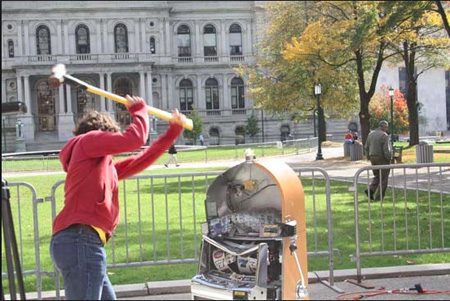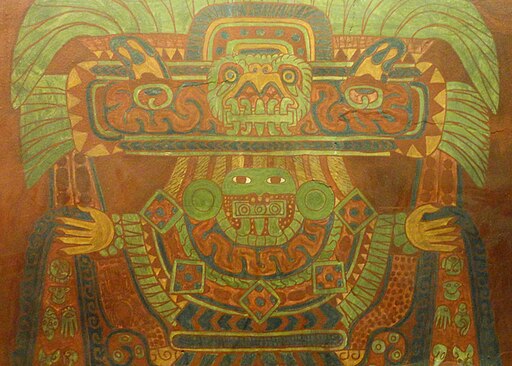It is not news that communities desperate for jobs and economic development often make terrible long-term decisions, welcoming in development and developers that are damaging in all sorts of ways—environmentally, socially, economically for the long-run.
Casinos are one new face of this: They promise a huge burst of jobs, both construction and staff level, plus tax revenue, and play neighboring communities off each other. Given the dazzling short-term numbers thrown around, casino development in a state where they have been recently legalized, as here in New York, is very, very hard for a local community to turn down.
Bill Sisk Of The Rockefeller Institute Smashes A Slot Machine In Front Of The State Capitol, October 2013. Photo from The Albany Web Log
But if they know what's good for them, they will.
As I wrote about in my column for Albany's newsweekly last week, the Insitute for American Values has compiled all the independent research about casinos' effects on communities and the picture isn't pretty. Though I don't always agree with IAV, this was not a moralistic anti-vice report, but a clear-eyed practical look at the effects of casinos on income inequality and distressed communities. It was chilling, and if you have a casino development proposed, or a ballot measure to legalize them, in your area, I strongly recommend reading the whole thing.
Regional casinos are not tourist destinations, and they are not frequented by the wealthy. This isn't Vegas. Casinos are a wealth extraction tool that transfers money from the poor to the rich, with some passed to the public sector along the way to secure their approval. They create gambling problems (their business model requires them) and harm local businesses with their free food and entertainment lures. From the IAV report:
Casinos do not revive local economies. They act as parasites upon them. Communities located within 10 miles of a casino exhibit double the rate of problem gambling. Unsurprisingly, such communities also suffer higher rates of home foreclosure and other forms of economic distress and domestic violence.
Unfortunately, anti-casino organzing is difficult, and faces many of the tensions that any organizing against “low-road” development that promises jobs faces. As a local activist commented in a discussion on my column:
Right now we have a lot of predominantly white middle class educated folks who don't need jobs essentially NIMBY'ing casinos while predominantly poor communities of color are looking at this as a god send for their communities b/c they believe a casino will bring jobs and prosperity. It's going to be sticky for any groups forming to walk a respectful path that is inclusive to the entire Albany community.
Casino legalization is picking up steam, and I'm guessing this is going to be a growing concern in more and more communities. I'd be curious to hear from readers who have taken it on or are considering taking it on.






Have there been studies of the impact of casinos in Native American territories?
Rest assured, these things will probably be banned soon.